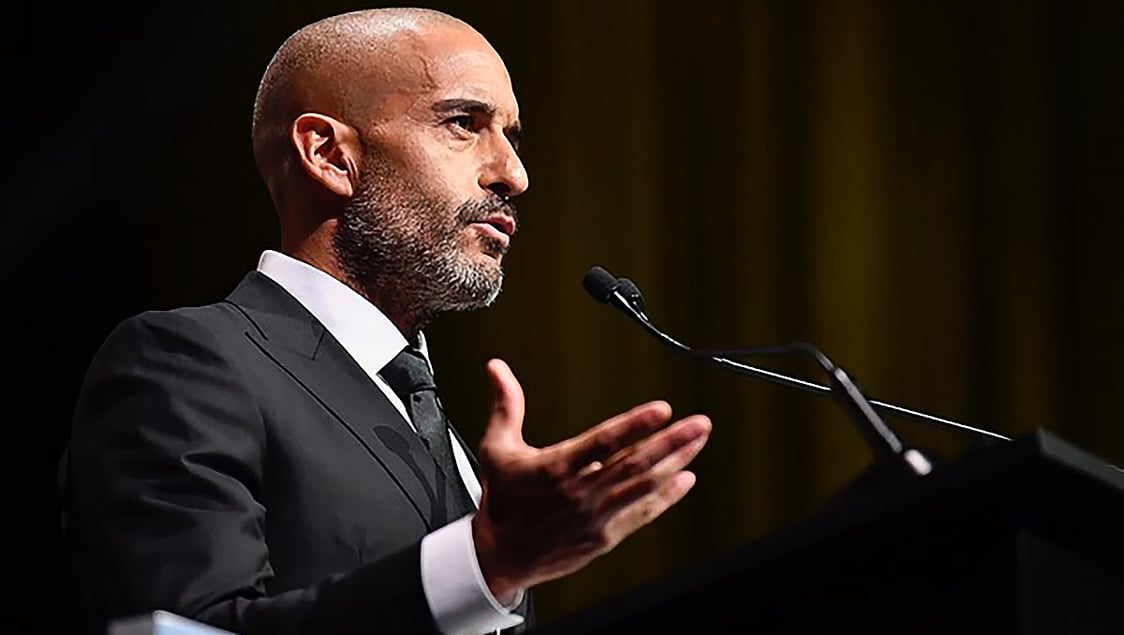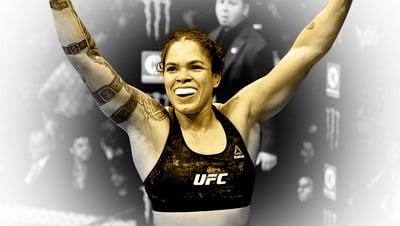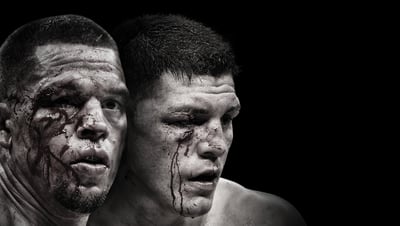
Issue 202
February 2024
Jon Anik has become the quintessential voice of the UFC, guiding fans through the most heart-stopping moments in MMA with precision and passion for almost 17 years. As the UFC's lead play-by-play commentator, Anik's expertise and enthusiasm elevate the fight experience, connecting viewers intimately with the drama unfolding inside the octagon. Fighters Only’s Ray Klerck caught up with Jon to delve into the nuances of his role and the evolution of the UFC's storytelling fabric.
What got you involved with MMA commentary and drew you to the sport?
For a while, I was doing many different things, and ESPN wanted a lot of their talent to be Swiss Army knives. The jumping-off point was a boxing radio show based out of Boston, Massachusetts. I had become very passionate about boxing and there was this oncoming avalanche called mixed martial arts in 2006. As boxing radio journalists, we didn't know what to do with it. We got invited via our Mouthpiece Boxing Show to cover EliteXC I in Southaven, Mississippi, and the main event was Frank Shamrock against Renzo Gracie, with a myriad of other MMA stars on the show. So we went there, perhaps reluctantly, to cover this mixed martial arts event, and it effectively changed my life forever. I don't know if it was that night that crystallized everything for me, but I saw how much more it had to offer than boxing as a live event. And I say that with all due respect…I covered a boxing death in 2005 that sort of turned me off to boxing a little bit. But MMA just seemed to have it all, and this was a promotion that was just getting started. So, my wheels started to turn. In 2008, I got to host ESPN MMA Live, which started on ESPN UK and eventually got to ESPN 2 in the US. I did Bellator in 2009 and then got an offer from the UFC in 2011, when they were doubling their live-event inventory from 20 to 40 shows. It happened pretty quickly but I am thankful I got on the right wagon.
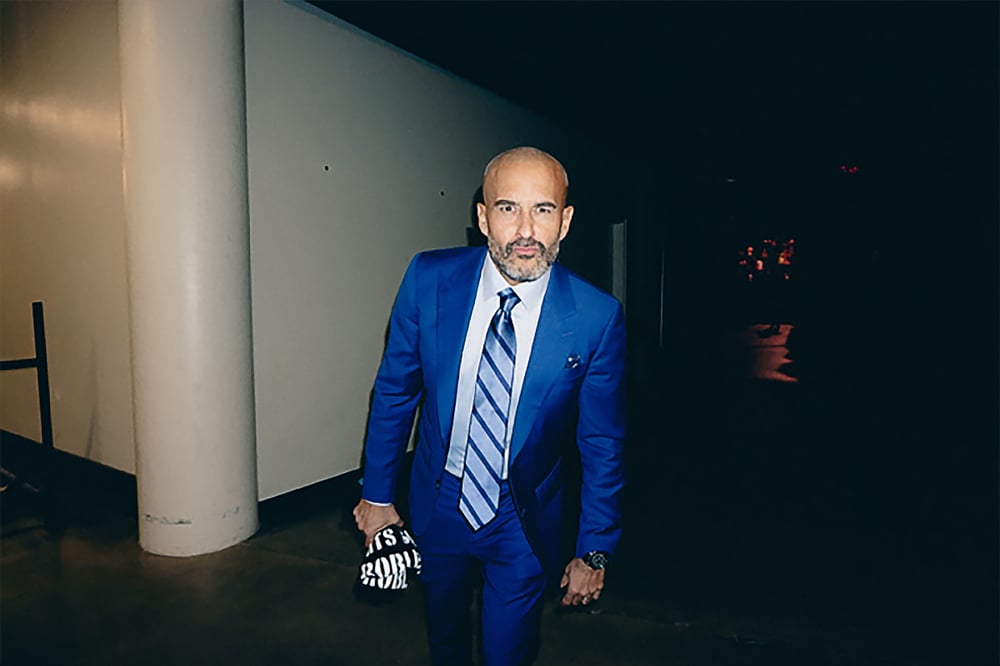
Is there a fight that’s the most memorable to you?
There were a lot of early moments. I remember 2013 being a big year…Wanderlei Silva knocking out Brian Stann in Japan. It was the year Vitor Belfort went to Brazil three times and we watched him knock out Michael Bisping, Dan Henderson, and Luke Rockhold successively. And arguably for a time, the best fight I called was between Antonio ‘Big Foot’ Silva and Mark Hunt in Brisbane, Australia, also in 2013. So that seemed like a big year early on. But I think Leon Edwards’ knockout of Kamaru Usman would certainly be the most memorable moment for me to date. And for more reasons than one. Certainly in part because of the call, even if people probably give me too much credit for the “That is not the cloth from which he is cut” line. But that knockout itself was one of the most special moments any of us has experienced as UFC commentators. I mean, just to win a world title like that. What Usman was chasing in terms of Anderson Silva's history…to have that flip on a dime and to have a second British champion, that moment was insane. But it's almost like, how much time do you have? Rose Namajunas knocking out Joanna Jedrzejczyk in 2017. There have been a ton of big moments. We just want to make sure that every time there's a championship moment, especially a fighter breaking through and winning a belt for the first time, as we just saw with Illia Topuria, we're making those moments count because that's the soundtrack that has to withstand the test of time.
What is the preparation process you go through before an event?
There's a lot of mental preparation and then some physical preparation just to get my head right. If that just means running four or five miles on show day, I do whatever it takes to get myself as close to prime as possible. This is to try to make sure that you've controlled the ‘controllables’ to create the best possible broadcast. I always tell people my anxiety about this job is all in the preparation and not in the performance because there might be a given Saturday night where we have 30 fighters competing. That's where the preparation begins for me, just trying to devote as much time as humanly possible to 28 or 30 fighters in a given week. So that's really my focus, just trying to ingest as much of each fighter as I can, biographically and otherwise. And then, later in the week, the focus shifts to show formatting and writing my pay-per-view open, which we then memorize. But this is the devil I know…this is the beast that I've now prepared for, at least the pay-per-views, since 2017. With every one of these, there's definitely some relief when it’s in the can because it's an endeavor.
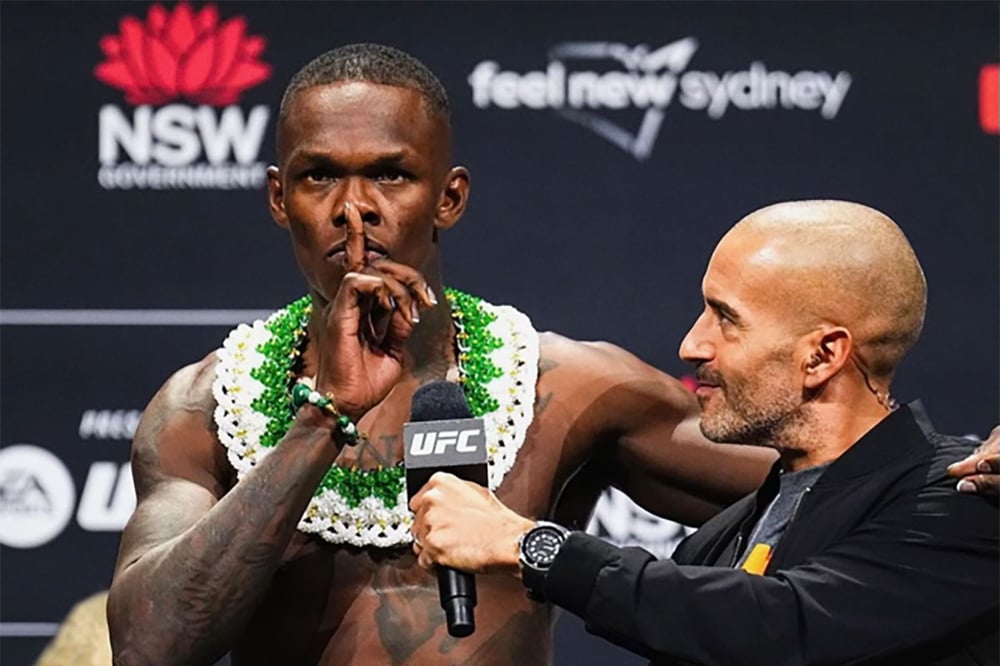
How do you stay impartial, especially if you've got a personal relationship with a fighter?
At this stage of my career, I am often the oldest guy in the room, and I have connective tissue and interpersonal relationships on both sides of the fight. Even if you look at Ian Machado Garry versus Geoff Neal. I've called a lot of Geoff Neal's fights, and his head coach is one of my best friends in MMA, but I'm close with Ian and his family. So, with a fight like that, I have relationships on both sides, making it easier, if not a non-issue completely. When my dear friend Dominick Cruz is making that walk, I've spent so much of my recreational and personal time with him so there's a little bit of a different butterfly on nights he's fighting. But I'll tell you…as soon as he hits that walkout tunnel, the last thing I'm thinking about is my friendship with Dom. If anything, subconsciously, you probably give the other guy more credit. But I feel like the hardest part about being objective is simply that this sport moves so quickly. People land strikes simultaneously, so regardless of whether or not you have a relationship with any athlete, you just want to make sure that you're totally sharp and locked in to witness and then relay the action to the viewers. Sometimes when strikes are being landed by both fighters, as a fight goes on, you tend to subconsciously lean towards one fighter who's landing, and that can become the narrative. So I'm just trying to have an eagle eye on it and make sure I see as many strikes as humanly possible, regardless of who is competing.
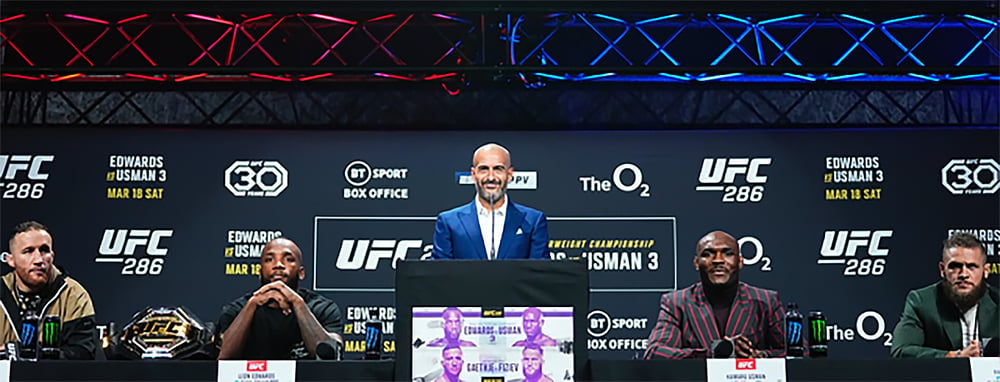
What do you think sets MMA apart regarding the broadcasting challenges and opportunities?
In many sports, like American football, the line between the play-by-play announcer and analyst or color commentator is pretty clear. The play begins and the play-by-play guy handles that, and then, at the end of the play, there's a bunch of real estate for the analyst or color commentator to assess what has just happened. That line is a little bit blurred with MMA, and that can be compounded when you have a three-man booth versus a two-man booth. The challenge is to ensure that there's never a traffic jam or at least that we minimize the instances in which there's a traffic jam. And I think that takes some give and take from all of us. I certainly have no problem staying in my lane, and I have done that since my first UFC broadcast. I am not trying to overstep when I'm staring to my right at the greatest of all time, Joe Rogan, and in all likelihood, a Hall of Famer like Daniel Cormier or Michael Bisping to his immediate right. So, I feel like we've found a pretty good groove. And even in as many as different broadcast-booth combinations as I’ve worked in, you kinda feel like you either have chemistry, or you don't, almost from show one. The first time I worked with Joe Rogan was at UFC155 in 2012 on three days' notice. And you kind of have chemistry, or you don't. Thankfully, we hit it off that night and started working together in a more full-time capacity a few years later.
How has the role of the broadcast team evolved with the growth of MMA over the years?
The announcing teams have become more of an institution. If a fan's favorite fighter competes three times a year, that is pretty good. Well, I'm trotted out there 25 times a year and we're just trying to be as listenable as humanly possible. I feel like my profile has grown over the last several years, but the work and the job haven't changed. I'm constantly trying to scrub my own work, assess my own work, and become a better play-by-play man. And that can be something as simple as learning how to pause better instead of using a verbal crutch. But I definitely have a passion for the play-by-play craft, and as soon as I lose that, I'll probably go do something else.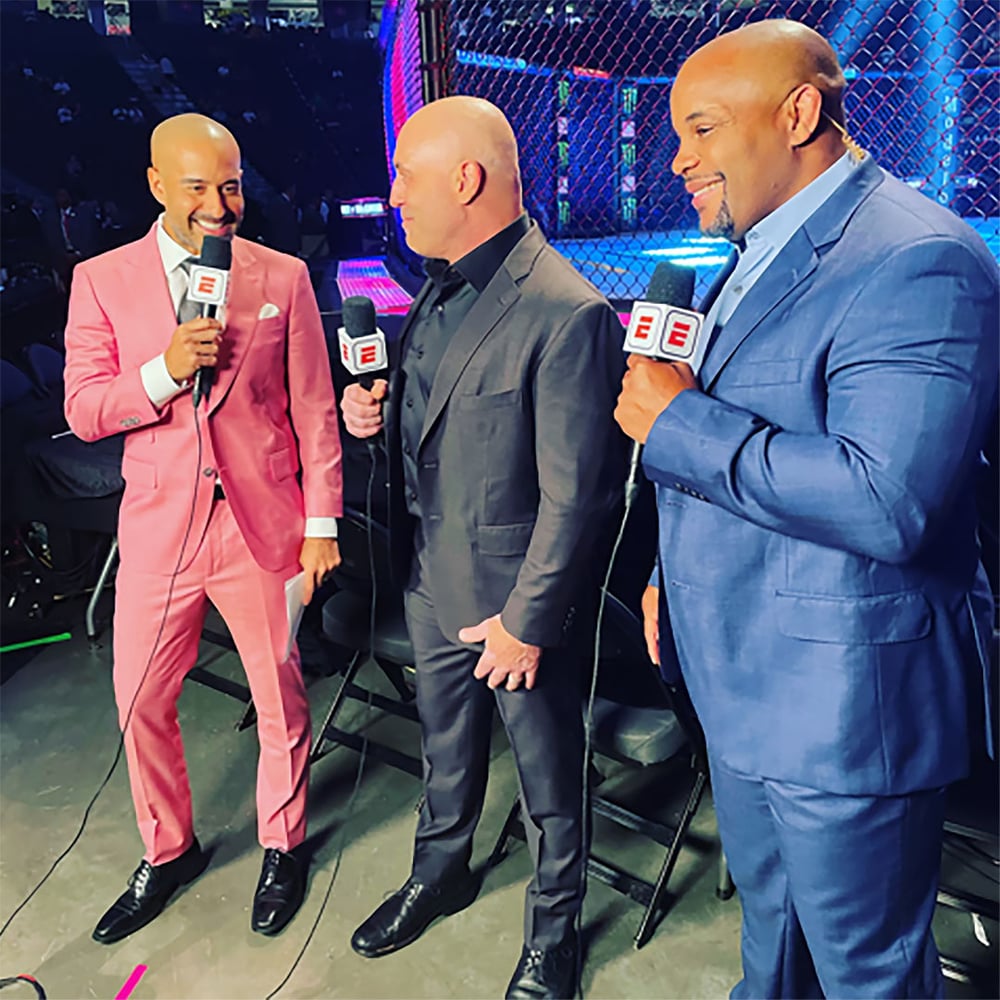
How do you balance providing technical insights to the more seasoned MMA fans while staying accessible to newcomers?
Sometimes you might hear me ask a question that sounds rhetorical in nature to an avid fan, and they probably expect that I know the answer to that question, but I'm just trotting it out there, perhaps to lead a horse to water. Maybe just to inform the more casual fan about something that might be a little bit complicated. We do find that our fan base turns over every several years, say every three to four years, there are constantly new people watching these fights. So, anytime we can simplify it without dumbing it down, that is something we're going to try to do. And there are still things that I don't know. I have no problem being like - “Joe, can you explain exactly what that terminology is?” Whether it's something like a whizzer that could be simplified to an overhook or whatever the case may be. So, sometimes simplification happens on the broadcast, and maybe it serves as a brush-up for the avid fans as well.
Is there a process for building the chemistry with the co-commentators?
Candidly, there's not as much recreational time as I would like in terms of spending that time that can further foster chemistry with the broadcast partners. Certainly, when I was working with Brian Stann back in the day, we would share every meal together. We would bring our notes to those meals, and I really enjoyed that, but the broadcast booth is constantly changing now, so we don't have as much of that. I think we've worked together for so many years that we all like being around each other in a general sense. And when we get the chance to spend time together in fighter meetings or having dinner on a Thursday or Friday night, there's definitely an underlying friendship there. I consider all my broadcast partners to be dear friends. I could call any one of them to talk about a problem in my life. I think that helps. But the nature of our beast is such that, more often than not, it's somebody else coordinating dinners because I got fucking 30 fighters that need my attention.
How has the fan reception and interaction changed for you with the rise of social media?
When I started, you had Mike Goldberg and Joe Rogan as the broadcast staples. I think for a lot of fans, just hearing a new voice do play-by-play for the UFC was off-putting. So, I feel like I needed to earn any goodwill I've established with the fan base over the last 13 years of doing this. But gosh, man, I'm just so grateful for this fan base. When I get off the air, more often than not, it's just a lot of love, adoration, and comments that build my confidence going into the next pay-per-view. I can't tell you how many times I'll share my pay-per-view open with the fan base on Instagram, and people just say the nicest fucking things. It makes me want to further earn it. When Dana White is your boss, you can be terminated without cause at any time. You got to earn that fucking lead play-by-play seat with every pay-per-view. And that's leadership that I respond to. Like I need to earn that seat for Dana and for the fans. Those are really my two primary areas of focus going back to what I said earlier: trying to be as listenable as possible for eight hours and not get in the way of the live sporting event. When people like you and think we enhance the sport, like that's all we're looking for. It's the ultimate compliment. I greatly cherish my relationship with the fans. I will never post and ghost. I will always be a conduit for them. My podcast will never be behind a paywall. That's the least I can do for all the support.
How do you think the MMA fan base will evolve in the future?
Domestically, I feel like we have a much bigger footprint than we had before the Fox and ESPN deals. So, there's a newer American audience tuning in. I think there are a lot of sports bettors that are now finding mixed martial arts. It's hard to get too predictive when it comes to the evolutionary nature of the fan base because it turns over so quickly. You can feel like you're in a not-so-good ebb and flow sometimes with fights, and then suddenly you rip off three fights and make martial arts the talk of the town. With the fan base, it's cyclical. But I do think that it's getting younger, it's getting more passionate, it's getting bigger by the day. And I think a lot of us Americans thought that eventually the sport would be as big here as it is in say Australia or England, and we're getting there. We're closing the gap. We're not there yet, but we're getting there.
Have you got an I-made-it moment in your career?
In December of 2016, when they pulled me aside in Las Vegas behind the TV trucks and let me know that they were moving on from Goldberg and giving me a chance to be the lead play-by-play voice of the UFC. I mean, my hands dropped to my knees. That was the greatest moment of my career, even trumping when I got hired by the UFC or hired by ESPN because, when I left ESPN, there were a lot of people who wondered why I did that. It took me years to get to ESPN. Why would I leave for the UFC that was maybe going to be on the G4 network? And the answer was because I felt like I could ascend and be the number one guy on the paper per view and call flights with Joe Rogan, and I never would have left ESPN if I didn't think that could be a reality. So, when I got that promotion, that was a very special day. But I don't know, I'll never think I've ‘made it’. I want to lead the league in preparation until my last show. I want to create a gap between me and the next best guy. And I think my work ethic and my hours toward every show reflect that sentiment.
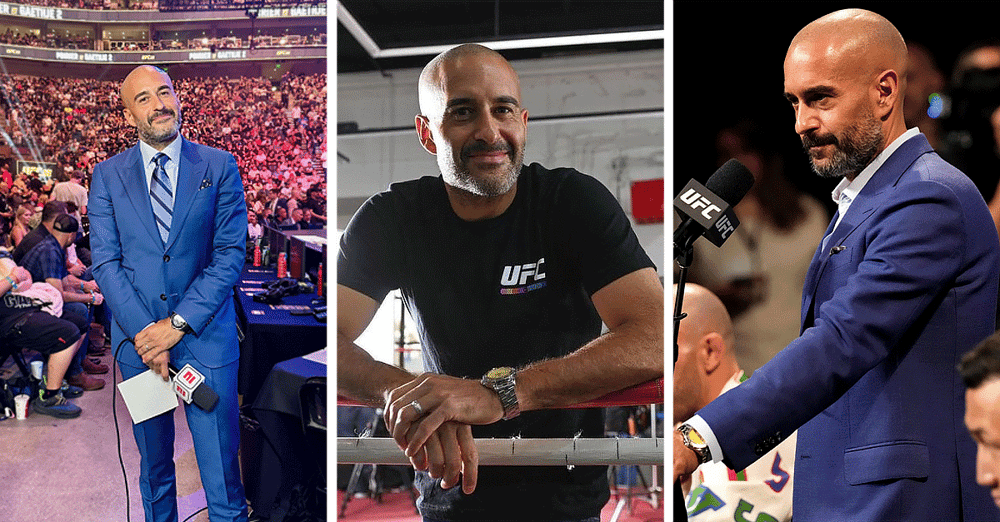
What is the most challenging name to pronounce, and how do you practice it?
There are a lot of Polish fighters like Joanna Jedrzejczyk, who have names that would suggest that Americans can't even move their mouths in the right way to properly pronounce her name. In a broad sense, I always say that if you practice these names 50 times, then you won't need phonetics come Fight Night. But there are still names, like the one I'm going to give you now, that are tough. Mateusz Rebecki. The last name is obviously spelled R E B E C K I, but it's pronounced “roun bet ski” with the R O U N sound. So, Mateusz Rebecki is the one that really gets me. And I have to constantly practice because you're looking at Rebecki, and it's actually “roun bet ski”. A lot of the Polish names are the ones that are the most challenging. And then some of the Asian ones can be a little bit tricky. I have audio of every single fighter saying their own name on my phone. But here's the rub: all of my colleagues also have access to this. Everybody in the company has access to all the fighters, and when they show up to town, they say their name to tape. We have a feature on ‘The Anik and Florian Podcast’ called the ‘Pronunciation of The Week’. And we bring one of those files to the fan base every single week. I listen to all of these files a bunch, but for some of them, I’ve got to practice saying it 50 times whereas some of them you can commit to memory right away.
What are your thoughts on the World Mixed Martial Arts Awards and the Fighters Only brand?
I'm just so thankful Fighters Only has sustained with the World MMA Awards because it's a huge undertaking. It means so much to the athletes and to the people in the sport. Largely, the most basic human need is to feel appreciated and while there are a lot of opportunities for our athletes to get widespread recognition, The Fighters Only World MMA Awards is the only show of its kind. It's the only thing that has sustained annually. So, it's a big deal. I mean, you talk about the greatest days of my career, and this is not hyperbolic at all, when I found out that my podcast had been nominated in the MMA programming category, it just was validation of everything we had done for nine years. It's the nomination oftentimes that feels as good as winning the award. It's just a nice way for the entire sport to gather together. And, obviously, the fans are inexorably linked as they vote on the winners. I'm really thankful that it's there so you can be sure I will be showing up every year to support and do anything I can to keep it going.
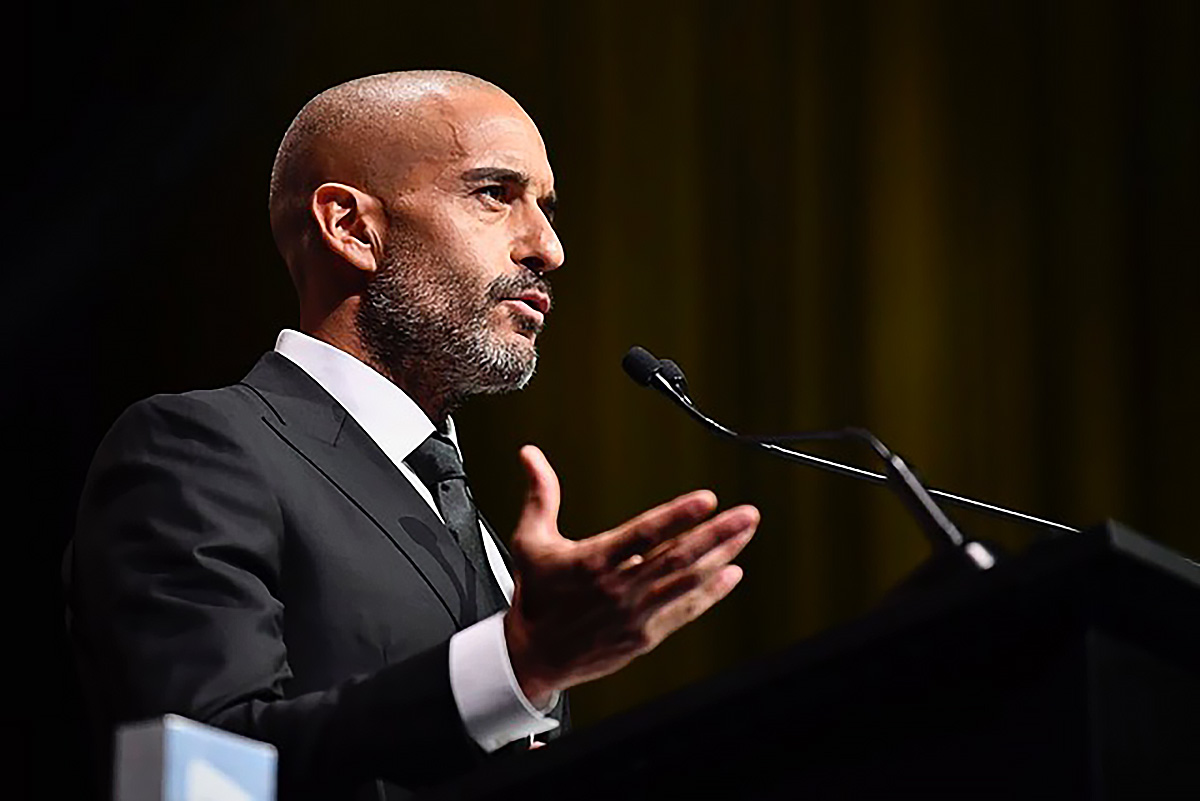
Is there a fight that stands out in your mind that almost represents a turning point in MMA history?
I feel when Junior dos Santos and Cain Velasquez fought on Fox in the United States, it seemed monumental because the company is an American company even though our most ardent fan bases are all around the world. So, getting network television on board with the UFC will always be a huge moment. And it was certainly around that when we doubled from 20 to 40 events a year. I’ve done 28 or 29 shows in Brazil, which felt like the biggest deal in the world when we took over Brazil. I would say during COVID-19 and how Dana White kept everybody employed and just being bullish about putting on live events because when nothing else was going on, we really were able to extend not just our domestic footprint in the United States but to extend our footprint across the world as the sport that was the one that was still going on when a lot of the others were idle. We're all masked up on Abu Dhabi, Fight Island. It was an incredible time. The fact that the UFC was still bringing live events to the masses was a turning point in mushrooming growth into the sport.
What can we expect from UFC 300?
When I was asked on our year-in-review show last year about my dream flight for 2024, believe it or not, I said Yan Xiaonan versus Zhang Weili for the Strawweight Title. So, I'm very excited to see what Yan Xiaonan can do with that. She has no problem playing the role of the heel and being the bad guy in that equation. Max Holloway and Justin Gaethje truly is a dream flight. I was just with Max at UFC 298, and he looks fucking enormous. So that is very exciting for me. At least that fight on paper. But people are sleeping on this main event. They truly are. Jamahal “Sweet Dreams” Hill is criminally underappreciated. He's not nearly respected, relative to his skill set. And I think Alex Pereira is one of the biggest superstars in the sport at present. Some people don't quite understand the depth of his star right now. He goes to a live event, and people go crazy as if Elvis Presley had walked into the room. Am I dating myself? I mean, it is wild to see the fan reaction to Alex Pereira and the extent to which he has resonated with UFC fans. So, it might sound like promotional hyperbole, but I fucking love this main event. A handful of undisputed titles could have been on the line, but this light-heavyweight one is a good main event. I don't think the scorecards are going to be needed, but you never know.
To shop Jon Anik merch, like his “One More Sleep T-shirts” visit www.Jonanik.com and listen to him on the Anik Florian Podcast

